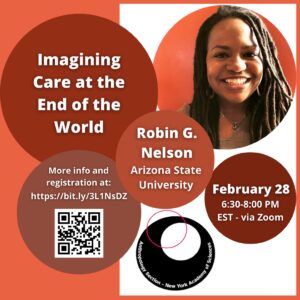NYAS Lecture 2/28: Imagining Care at the End of the World

General
The New York Academy of Sciences Distinguished Lecture Series continues on February 28th, 6:30 PM EST, when Dr. Robin G. Nelson presents, “Imagining Care at the End of the World”.
To register for this event click here. This event will also be livestreamed on YouTube.
Anthropology’s fascination with kinship and sociality developed at the very origins of the discipline, and has resulted in studies of all manner of topics ranging from the evolution of modern human interbirth intervals to food sharing. Taken together, this research reveals that familial configurations are fluid, and responsive to individual desires and needs, cultural practices, and socio-economic pressures. In my research, I explore core concepts in evolutionary studies of the family, including parental investment and extended kin care in the contemporary contexts of urban and migrating populations living in industrialized spaces. In March of 2020, one submicroscopic intracellular obligate parasite – a virus – began unraveling the social fabric upon which we all so heavily rely. In this talk, I will discuss the evolutionary mandate for deeply engaged human social interactions and the ways that these relationships both structure our everyday lives and render us vulnerable when isolated or neglected. The on-going syndemics of COVID19, structural inequality, and the climate crisis compel us to identify ways to recreate community for our survival, and be willing and able to imagine and implement care models at all levels of relations from our neighbors and kin to our states and federal governments. Evolutionary theory provides insight into the necessity of engaged and supportive network building even at the end of the world.
Featured Speaker
Robin G. Nelson is an associate professor in the School of Human Evolution and Social Change at Arizona State University. With a focus on critical periods of growth and development, she investigates the relationship between familial dynamics, culturally salient forms of social and financial capital, and the health of Black Caribbean families. Her work engages with research in cultural anthropology, public health, gender studies, and Black feminist studies. She also investigates equity in science and the legacy of racism on theory building in biological anthropology. She received her doctorate from the University of Michigan in 2008, and then completed a post-doctoral fellowship at Northwestern University in the Laboratory for Human Biology Research. Dr. Nelson was most recently a faculty member at Santa Clara University before arriving at ASU this Fall.